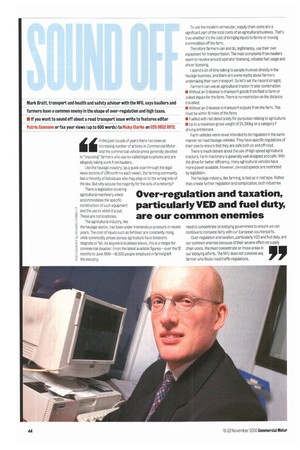6 In the past couple of years there has been an
Page 46

If you've noticed an error in this article please click here to report it so we can fix it.
increasing number of articles in Commercial Motor and the commercial vehicle press generally devoted to "exposing" farmers who use so-called legal loopholes and are allegedly taking work from hauliers.
Like the haulage industry (as a quick scan through the legal news section of CMconfirms each week), the farming community has a minority of individuals who may step on to the wrong side of the law. But why accuse the majority for the acts of a minority?
There is legislation covering agricultural machinery which accommodates the specific construction of such equipment ›
L and the use to which it is put. g These are not loopholes.
The agricultural industry, like cr the haulage sector, has been under tremendous pressure in recent 7 -;.-,-' years. The cost of inputs such as fertiliser are constantly rising, -i' while commodity prices across agriculture have tended to , t stagnate or fall. As anyone in business knows, this is a recipe for
5 commercial disaster. From the latest available figures—over the 12 F2 months to June 1999-19,500 people employed in farming left
0
F,.. the industry. To use the modern vernacular, supply chain costs are a significant part of the total costs of an agricultural business. That's true whether it's the cost of bringing inputs to farms or moving commodities off the farm.
Therefore farmers can and do, legitimately, use their own equipment for transportation. The main complaints from hauliers seem to revolve around operator licensing, rebated fuel usage and driver licensing.
I spend a lot of time talking to people involved directly in the haulage business, and there are some myths about farmers undertaking their own transport. So let's set the record straight.
Farmers can use an agricultural tractor/trailer combination; • Without an 0-licence to transport goods from field to farm or collect inputs for the farm. There is no restriction on the distance travelled; • Without an 0-licence to transport outputs from the farm. This must be within 15 miles of the farm; • Fuelled with red diesel solely for purposes relating to agriculture; • Up to a maximum gross weight of 24,390kg on a category F driving entitlement.
Farm vehicles were never intended to be regulated in the same manner as road haulage vehicles. They have specific regulations of their own to ensure that they are safe both on and off road.
There is much debate about the use of high-speed agricultural tractors. Farm machinery is generally well designed and safe. With the drive for better efficiency, many agricultural vehicles have more power available. However, on-road speeds are restricted by legislation.
The haulage industry, like farming, is bed up in red tape. Rather than create further regulation and complication, both industries need to concentrate on lobbying government to ensure we can continue to compete fairly with our European counterparts.
Over-regulation and taxation, particularly VED and fuel duty, are our common enemies because of their severe effect on supply chain costs. We must concentrate on those areas in our lobbying efforts. The NFU does not condone any farmer who flouts road traffic regulations.








































































































